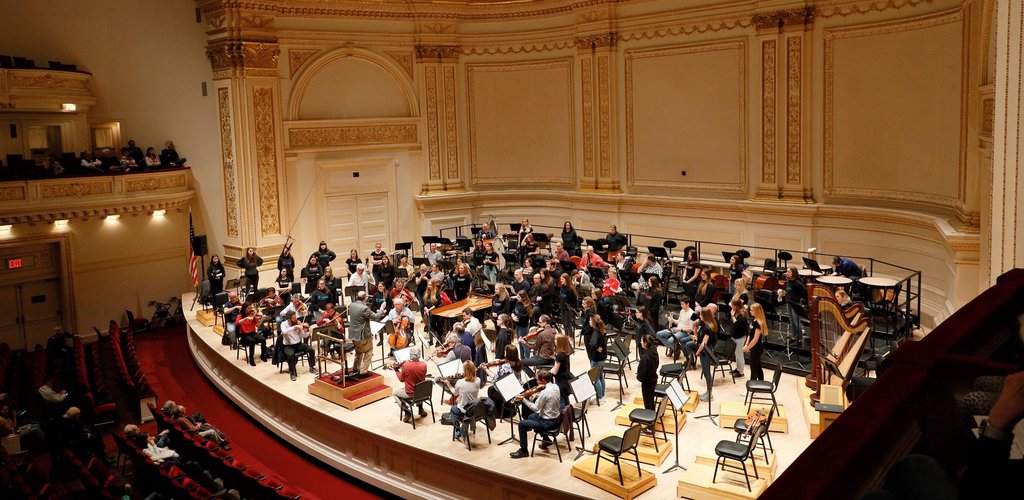With notable Hungarian-Americans such as former New York governor George Pataki in attendance, conductor Iván Fischer and the Budapest Festival Orchestra gave a pops concert in reverse Saturday night in Carnegie Hall. Instead of playing a few classical selections and then swinging into pop, Fischer had a singer and string trio start things off with village music as Béla Bartók might have heard it, then led a searing performance of Bartók’s opera Bluebeard’s Castle. A critical review by David Wright, New York Classical Review.
The idea, Fischer explained from the stage, was to get the shape of authentic Hungarian melodies and the rhythms of the Hungarian language in one’s ears, the better to hear how they shaped Bartók’s only opera. Judging from the vociferous reaction to Fischer’s introduction of folksinger Márta Sebestyén, more than a few in the audience were already well versed in Hungarian popular culture.
But everyone present could be an honorary Hungarian for a few minutes while tapping a toe to the infectious folk stylings of three players from the orchestra: violinist István Kádár, violist András Szabó, and bassist Zsolt Fejérvári. Kádár led the way with slithery portamento in the ballads and flashing staccato in the up-tempo movements. Fejérvári got a laugh by handing his bow to Fischer so he could slap that bass with abandon.
After the string trio performed down-home versions of the tunes immortalized in Bartók’s popular Romanian Folk Dances for piano, Fischer and the orchestra weighed in—and that is truly the word—with the composer’s plush symphonic arrangement of the suite. Despite a soulful and spirited performance, what used to sound so fresh and exotic in the context of a symphony concert now sounded somewhat overstuffed compared with the real deal for three players.
The process was repeated with eight movements from Bartók’s Hungarian Peasant Songs, with the excellent addition to the folk group of Sebestyén, who stood still and sang gently in a soft, reedy voice at first, then gradually picked up both the tempo and her feet, shifting at last (if a non-speaker of Hungarian can judge) from words to bubbly scat. The audience, as they say, went wild.
The orchestra followed up again with a colorful performance of the composer’s arrangement of the same tunes. The audience went politely, classically wild. There were some empty seats after intermission, as enthusiasts of the Hungarian hootenanny elected not to stay for the expressionist opera. They missed hearing the orchestra do what it came this long way to do: not play arrangements of charming piano pieces, but bring to life one of the most original and potent scores in the repertoire.
The libretto by Béla Balázs of Bluebeard’s Castle, steeped in symbolist poetry and Freudian dream imagery, is about as far from operatic verismo as you can get. After a Bard speaks a prologue to set the real/unreal scene (“Is the stage inside, is it outside, my lords and fair ladies?”), the enigmatic Duke Bluebeard and his young bride Judith arrive at his dark, oppressive castle. Behind seven locked doors lie the secrets of Bluebeard’s soul and Judith’s fate. She insists on opening them all, one by one.
The effect is not the typical horror-movie scenario (don’t go in there!) but rather a frightening, reluctant, but inexorable journey of self-discovery in the dark mirror of the Other.
Conductor Fischer began the performance by delivering the prologue himself insinuatingly in Hungarian—helpfully translated by supertitles—then conjuring the castle’s gloomy atmosphere from the orchestra. As each door opened—on, say, a torture chamber, or a treasure room, or a sunlit landscape—Bartók outdid himself to express not only the scene itself but the psychological response to its meaning.
Conductor and orchestra were with the composer every step of the way, fine-tuning his unheard-of doublings (flute with trombone, piccolo with tuba) to unearthly effect, and vividly conveying the shimmer of the treasure room, the fragrance of the garden, and the massive C-major brilliance of Bluebeard’s “kingdom,” to name just a few.
They also gave an emotional boost to the performances of mezzo-soprano Ildikó Komlósi as Judith and bass Krisztián Cser as Bluebeard. With the advantage of singing in their native language, the two performed with intensity and commitment, coming across as something more human than merely an allegorical figure in a poet’s conceit. Though neither was blessed with that last, go-to-eleven power to dominate the orchestra in forte, their voices held up well in the taxing roles.
Playing the secretive, emotionally-withdrawn Bluebeard didn’t give bass Cser much that was “operatic” to work with, but the dark ring of his lowest register suggested that there might be no bottom to the pit of the character’s soul, and the agony of his gradual exposure by Judith’s curiosity was plain to hear.
Mezzo Komlósi sounded somewhat wobbly of voice and overmature at first as the young bride, but she cleared up vocally as she warmed to the character’s mingled fear and compulsion to know. Spontaneous responses, such as her tender delivery of the line “The castle is crying,” were welcome humanizing touches, and one wished for more of them.
At last, the performance made the long descent from maximum-fortissimo glory to night and nothingness. A chastened audience stirred itself to applause—not wild, but long and appreciative enough to bring conductor, soloists, and even the folk band and singer back to commemorate a very Hungarian evening.
